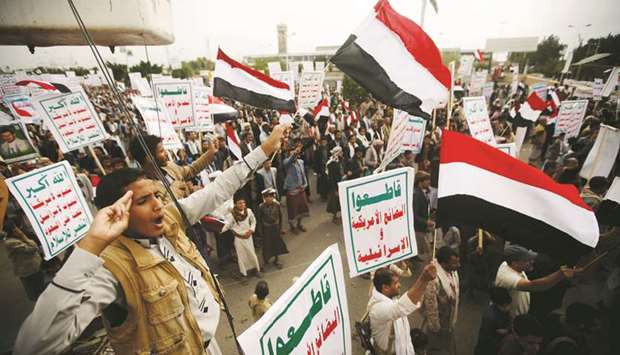The brother of Yemeni rebel chief Abdelmalek al-Houthi has been “assassinated”, the group’s TV channel Al-Masirah reported yesterday.
“The martyr Ibrahim Badreddine Amir al-Din al-Houthi has been assassinated at the hands of traitors” working for the Saudi-led coalition, the Houthi rebels said in a statement carried by the channel.
Yemen’s internationally-recognised government is backed by a Saudi-led military coalition against the Houthis, in a war that has been ongoing for more than four years.
The rebels did not provide any further details on the alleged killing, but said they would do everything “to pursue the criminal aggressors” responsible and bring them to justice.
A Yemeni security source, who declined to be named, said that Ibrahim al-Houthi was close to his brother and was the rebels’ commander for Saada, the Houthi stronghold in northern Yemen which borders Saudi Arabia.
Ibrahim was found dead in a house in Sanaa and the group has deployed additional forces around the city in response, a security source said.
The Houthis’ Interior Ministry put out a statement in which it blamed the killing on “the treacherous hands affiliated with the US-Israeli aggression and its tools”, without giving further details.
Saudi-owned broadcaster Al Arabiya reported that Ibrahim was killed along with eight bodyguards on Tuesday in the rebel-controlled capital Sanaa.
Ibrahim, thought to be in his thirties, was considered a key strategist for the rebels’ military operations in areas bordering Saudi Arabia.
Yemen’s war has killed tens of thousands of people, including numerous civilians, according to various humanitarian organisations.
Around 3.3mn people are displaced and 24.1mn - more than two-thirds of the population - are in need of aid, according to the UN, which views Yemen’s humanitarian crisis as the worst in the world.
Meanwhile, the World Food Programme (WFP) said yesterday it would resume the distribution of food to 850,000 people in Sanaa next week after a two-month stoppage, having reached an agreement the Houthi authorities.
The UN agency halted some aid in Sanaa on June 20 out of concern that food was being diverted from vulnerable people, but said it would maintain nutrition programmes for malnourished children, pregnant and nursing mothers.
The warring parties in Yemen’s conflict have both used access to aid and food as a political tool.
In a statement issued yesterday, the WFP said it would resume food distributions following Eid al-Adha which ends on August 13.
Spokesman Herve Verhoosel said a biometric registration process would be introduced for 9mn people living in areas under Houthi control.
“WFP is confident that putting in place biometrics will ensure food gets to the most deserving people and that diversion of vital food assistance is prevented,” it said.
A technical annex to a preliminary agreement reached last week was signed on Thursday, Verhoosel told a briefing in Geneva.
“The technical annex will allow WFP to establish an independent and accountable process to identify and register families who most need life-saving assistance,” he said.
The biometric system - using iris scanning, fingerprints or facial recognition - is already used in areas controlled by the Saudi-backed government that holds the southern port city of Aden and some western coastal towns.

A Houthi supporter shouts slogans as he joins a rally to denounce the blockade imposed by the Saudi-led coalition, outside Sanaa airport yesterday.
